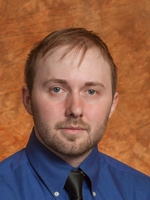The Center is home to an incredible faculty and host to the top minds at the intersection of law, science, and technology. But we also attract the brightest student scholars around; you should meet them.
 Alek Charles Emery, Class of 2018
Alek Charles Emery, Class of 2018
Hometown: Salt Lake City, Utah
Education: BS in Physics with a Minor in Mathematics (University of Utah)
Alek has always had a love for science and mathematics, and focused his studies on those subjects as an undergraduate. Following graduation, he took a job at Qualtrics where he worked with clients and developed in interest in computer science and cybersecurity. This led him to law school, where he studied IP law, focusing on patent prosecution.
In addition to serving as the Book and Film Review Editor for Jurimetrics: The Journal of Law, Science, and Technology, Alek took a prestigious externship with Federal Circuit Judge Kathleen O’Malley in Washington D.C. He has also accepted a position following graduation with Lewis Roca Rothgerber Christie in their Glendale, CA office.
Alek recently published a proposal for a new legal framework for regulating cutting-edge cybersecurity research. He was inspired in part by a question posed during Faculty Director Gary Marchant‘s Law, Science, and Technology course:
Are the existing governmental structures we have in place to regulate technology capable of keeping up with the pace of innovation?
As cybersecurity incidents increase in frequency, cybersecurity research comes under more public scrutiny. Alek set out find a more responsive regulatory structure using tort liability and safe harbor provisions. His article, Zero-Day Responsibility: The Benefits of a Safe Harbor for Cybersecurity Research, can be found in the most recent issue of Jurimetrics.















